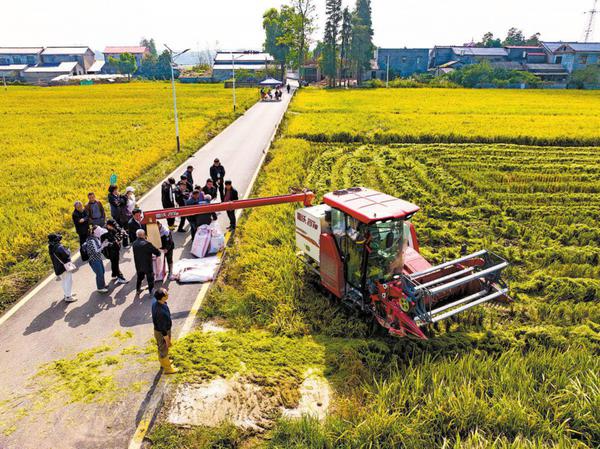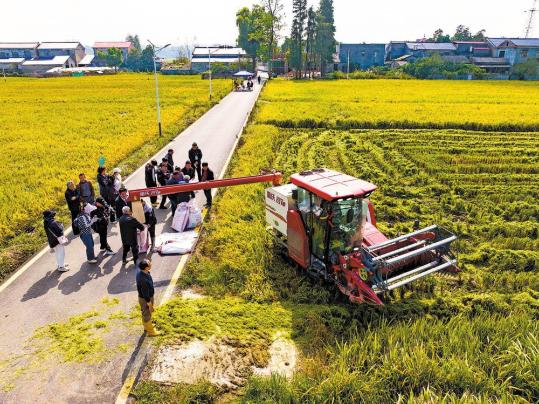Hunan grain base to ensure nation's food security

Farmers and experts assess rice yield in a grain production experimental area in Changsha, Hunan province, in October. The annual average yield of the double-cropping rice reached 19.3 metric tons per hectare. (YANG HUAFENG/CHINA NEWS SERVICE)
Hunan, a major grain production hub in China, is ramping up efforts to ensure food security, with plans to maintain its grain sown area above 4.76 million hectares this year while adding or upgrading more than 200,000 hectares of high-quality arable land, Governor Mao Weiming said on Tuesday.
Delivering the province's government work report on Tuesday, Mao said Hunan will establish a national grain reserve base to ensure the "rice bowl" of the Chinese people is filled with more grain produced locally.
Hunan's total grain output reached 30.78 million metric tons last year, setting a new five-year record, Mao said during the ongoing third session of the 14th People's Congress of Hunan province.
Wang Jianqiu, director of the Hunan Department of Agriculture and Rural Affairs and a deputy to the Hunan People's Congress, noted that Hunan is one of the 13 major grain production areas in China. The province accounts for around 4.4 percent of the nation's grain output with just 2.8 percent of the country's arable land.
Hunan ranks first in the sown area and output of rice in China. It is also ranked second in pig stock, first in the sown area of rapeseed, and is an important production hub for vegetables, oil and fruit, Wang said.
The province has made significant efforts to ensure that its arable land area does not decrease and that its quality continues to improve, Wang added.
Concentrated seedling cultivation has been widely adopted, and there is greater use of agricultural machinery to promote modernized agriculture, he said.
Hunan has also established 18 provincial exemplary grain production bases to improve grain quality and yield, upgrade farming techniques, increase production efficiency and reduce costs, he added.
Liu Hui, deputy head of Xiejiapu township in Changde, Hunan province, and a deputy to the Hunan People's Congress, said the exemplary grain production base in Gangzhongping village achieved a good harvest last year, with average rice yields increasing by 4.46 percent year-on-year.
"In the village, many young people have returned to their hometowns to become new farmers equipped with knowledge of agricultural machinery and more scientific farming methods," Liu said.
One villager, Dai Hong, bought two rice transplanters and an unmanned aerial vehicle last year, greatly improving farming efficiency, Liu said.
As a result, Dai expanded his farmland tenfold to 33 hectares, and his family earned 635,000 yuan ($86,600) from farming last year, he added.

